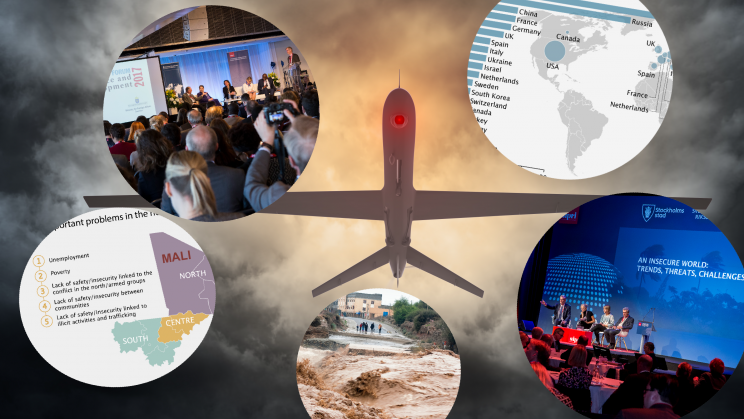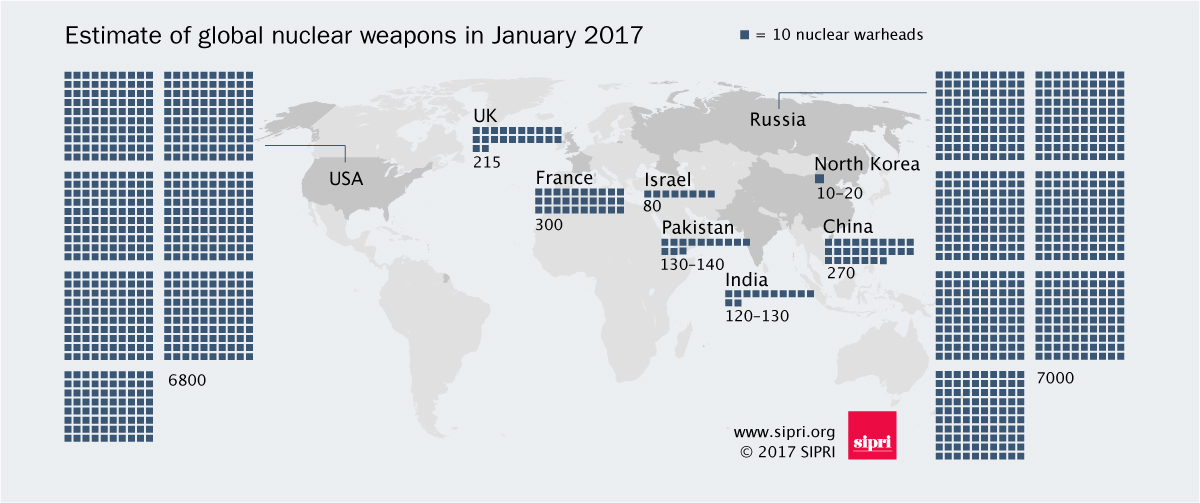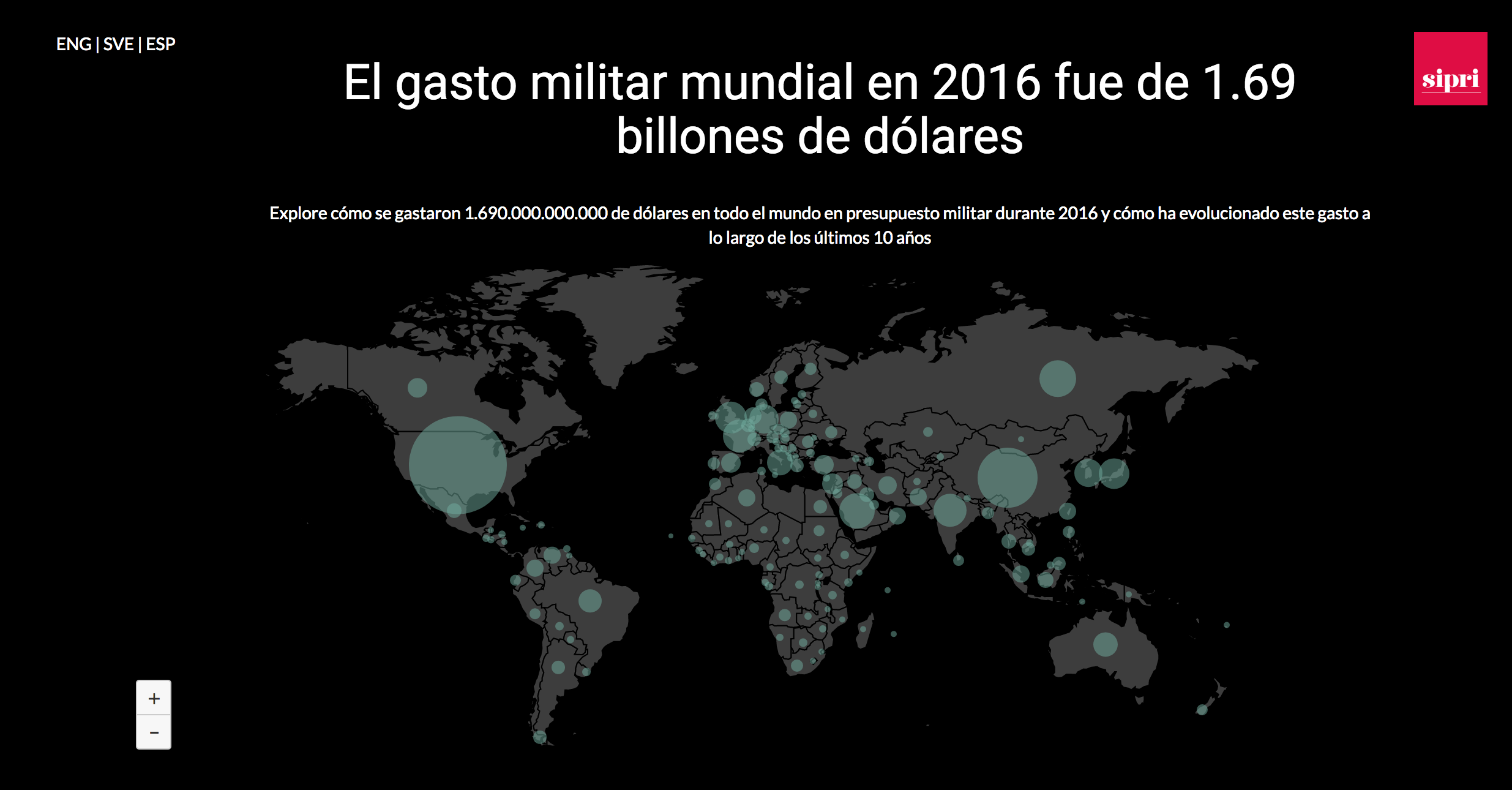
2017 saw a wave of uncertainty test structures of international peace and security, with tensions mounting on the Korean Peninsula, the United States signalling its intent to withdraw from the Paris Climate Change Agreement, a global treaty to ban nuclear weapons agreed and the continuation of violent conflict throughout many regions of the world. Over the past 12 months, SIPRI remained committed to providing reliable data and independent analysis to engage researchers, policymakers, the media and the public on the path to sustainable peace. The following is a few of SIPRI’s highlights of 2017.
Nuclear weapons and non-proliferation back on the global agenda
The continued growth of North Korea’s nuclear programme meant that nuclear weapons were a key focus of 2017. This year, North Korea carried out more than 20 ballistic missile tests and one nuclear test as the regime inched closer to developing a nuclear-capable intercontinental ballistic missile. In addition, the so-called Iran nuclear deal faced severe pressure despite Iran implementing it fully, according to the International Atomic Energy Agency. This year also witnessed some positive developments with the Treaty on the Prohibition of Nuclear Weapons opening for signature and the International Campaign to Abolish Nuclear Weapons (ICAN) winning the Nobel Peace Prize.

SIPRI promotes transparency in global nuclear armaments by releasing data on estimated nuclear weapon stockpiles around the world. In 2017, SIPRI research indicated that, despite a decline in overall stockpiles, all nine of the nuclear weapon-possessing states were in the process of modernizing their nuclear arsenals and would not be prepared to give them up for the foreseeable future.
Climate-security in focus
As US President Donald Trump signalled the intention to withdraw the USA from the Paris Climate Change Agreement, climate change remained at the top of the global agenda. SIPRI’s work on climate-security emphasises a growing need to fully understand the forms of security risk posed by a changing climate, recognizing what impact climate change has on the social and political landscape.
SIPRI has made the case for better knowledge and understanding in this field, at the same time examining why climate change should be an issue for the UN Security Council and, by extension, why climate security should have an institutional home within the UN and be integrated into the working streams of related international bodies.
A new era of militarization?
SIPRI’s research on arms and military spending has been at the core of the institute’s work since its founding in the 1960s. The three comprehensive and open-access databases (Arms transfers, Arms industry and Military expenditure) exemplify SIPRI’s core values of transparency and universality by using only open sources that can be independently checked and including data on nearly every country in the world.
Data released by SIPRI this past year shows an upward trajectory in all three of these areas. In particular, transfers of major weapons in 2012–16 reached their highest volume for any five-year period since the end of the cold war, and the SIPRI Top 100 Arms Industry figures indicated the first rise in arms sales since 2010. In 2017, SIPRI produced an interactive web platform as a way to visualise trends in worldwide military expenditure. For further visual analysis of international arms transfers, check out ‘The state of major arms transfers in 8 graphics’.

SIPRI's data releases attract global media attention and are one of the drivers of the institute's worldwide visibility. In 2017, SIPRI research appeared in over 22,000 media articles in more than 140 countries.
Security at the global and city level
Rapid urbanization is set to continue throughout the century and cities are quickly becoming a focal point of response to global security challenges. The second Stockholm Security Conference—on the theme of ‘Secure Cities in an Insecure World’—gathered leading representatives from the political, academic and business worlds, as well as civil society, in a joint endeavour to explore the multiple dimensions of security in cities in the global context.
In the Spotlight
SIPRI launched four new film series in 2017. One of these was ‘Spotlight’—a series of short interviews conducted on occasions where individuals have visited SIPRI for various events, seminars and workshops.
Spotlight seeks to capture an array of angles and viewpoints and provide starting points to contribute to dialogue and a better understanding of the conditions for peaceful solutions of international conflicts. Among others, SIPRI interviewed Beatrice Fihn, Executive Director of the International Campaign to Abolish Nuclear Weapons (ICAN); Filippo Grandi, the United Nations High Commissioner for Refugees; Ulrika Modéer, the State Secretary to the Minister for International Development Cooperation for Sweden; and Ambassador Wolfgang Ischinger, Chairman of the Munich Security Conference.
On April 27, the Government of Sweden announced that Ambassador Jan Eliasson, former Deputy Secretary-General of the United Nations, would become the new Chair of the SIPRI Governing Board. Watch his Spotlight interview below.
There was a significant increase in SIPRI’s audio-visual output in 2017, with followers watching a total of 65 continuous days of SIPRI content.
The importance of involving civil society: The case of Mali
As the frequency of attacks increased in Mali and insecurity extended to the central region of the country, SIPRI continued its in-country work in Mali with the Bamako-based organization the National Coalition of Civil Society for Peace and the Fight against the Proliferation of Small Arms (CONASCIPAL). Together, they set up a committee to establish the first Civil Society White Book for Peace and Security in Mali, and with the support of the Embassy of Sweden in Mali they launched the Malian Women’s Network for Security Council Resolution 1325. The security perception survey also continued to be carried out, revealing that international and national actors should take into account a wide range of expectations of the Malian population—which itself is diverse and affected in different ways by insecurity.
Dialogue, engagement and solutions: The Stockholm Forum
With the United Nations Sustainable Development Goals (SDGs) and Sustaining Peace agenda, a global framework for peacebuilding and development has been established. Within this framework, the global community needs to learn and be able share best practices for achieving these global goals. This is why SIPRI, together with the Swedish Ministry for Foreign Affairs, chose to focus on ‘Sustaining Peace: What Works?’ as the theme of the fourth annual Stockholm Forum on Peace and Development in May.
The Stockholm Forum is a major meeting point to share, discuss and problem-solve issues in peace and development by bringing together researchers, policy makers and practitioners from around the world. SIPRI amplified conversations and brought them to ever-larger audiences through an active online presence. As has become a staple for SIPRI’s major events, audiences across the globe could follow the event online and through social media—where #SthlmForum was a trending hashtag on Twitter throughout the two days.
The development of autonomy in weapon systems
SIPRI research on emerging military and security technologies follows the disruptive trends that scientific and technological breakthroughs can have on the conduct of warfare. In 2017, risks related to autonomy in weapon systems was an issue brought to the fore. A key moment was in August when 116 founders of artificial intelligence and robotics companies (led by Tesla’s Elon Musk) signed an open letter urging the United Nations to ban the use of artificial intelligence (AI) in weapons. The letter was published prior to the November meeting of the UN Group of Governmental Experts on Lethal Autonomous Weapons Systems in Geneva.
To coincide with the meeting, SIPRI launched its mapping study on the state of autonomy in weapon systems to inform people’s perceptions and provide important insights for nuanced discussion. In a bid to support transparency and assist states that are reviewing new weapon systems, SIPRI produced a conference, report, compendium and film to explore how to deal with the challenges posed by emerging technologies.
Stay-tuned for SIPRI’s complete Annual Review and follow for updates @SIPRIorg on Twitter and @sipri.org on Facebook. Subscribe to SIPRI’s mailing lists—including the monthly update—here.